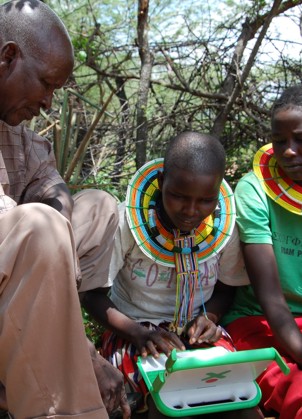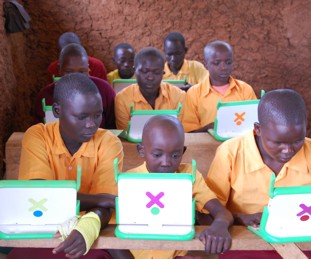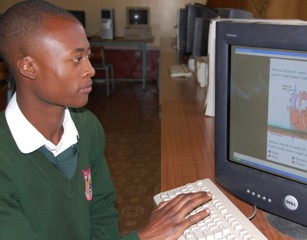|
Kenya Technology | Science - Education Kenyan pupils find teachers in laptops
Today, Gladys flips her laptop open, and quickly goes to 'Wikipedia' where she searches for the Circulatory System. An animation pops up. She goes to the Write program and describes what she has seen. She then moves to Record and take a picture of a whistling thorn in her school compound. She describes it too.
One such organisation is Kificom in conjunction with other development partners. It trains teachers on implementing ICT for learning. Kificom also installs and maintains computers for schools and coordinates content acquisition. So far, 400 teachers have been trained according to Mathews Kituu, Kificom's director. Mr Kituu estimates that some 70,000 pupils in the north rift region are on the e-learning pilot programme. He happily reports of an improved interest in learning in this remote region of Kenya. Kericho, Keiyo, Uasin-Gishu, Trans-nzoia and Wareng are other districts in the programme. "We have 100 laptops," teacher Krop boasts. "At first they were enough for all the pupils, but the numbers surged threefold when other children learnt about the laptops. Still we are managing." However, schools are confined to pre-loaded programs and cannot surf the internet due to poor connectivity and the attendant high costs. It is at Wareng High School in Eldoret town where we meet Kenneth Makokha, a Form Three student, trying to catch up with Circuits, a topic in physics. "After classes, I enjoy exploring issues on my own. Computers
What we are grappling with now is development of e-syllabus, says Mr Kituu. For now, apart from Msingi Pack there are no other known credible content developers. That may slow down the e-learning uptake. But Sakat Village - where Asilong is - is the least you would expect this technological flair. Electricity connection is still a mirage, classrooms have no windows, no doors and the walls made of mud are peeling off; other pupils' classes are stashed in the thickets. The Asilong laptops were a generous donation. The donor also supplied four solar panels, four batteries and an inverter. For many other Kenyan schools, computers are still expensive even though the state zero-rated tax on all ICT gadgets. Most educational stakeholders too are not sensitised on the importance of an ICT platform. "The challenges are many but we take pride in introducing e-learning among nomads. Pupils now have a wider scope of learning materials from their laptops," Mr Krop explains. "See, we don't have a library. We don't have enough teachers either. It is the laptop that is saving the situation around here." By Erick Wamanji © afrol News - Create an e-mail alert for Kenya news - Create an e-mail alert for Technology news - Create an e-mail alert for Science - Education news
On the Afrol News front page now
|
front page
| news
| countries
| archive
| currencies
| news alerts login
| about afrol News
| contact
| advertise
| español
©
afrol News.
Reproducing or buying afrol News' articles.
You can contact us at mail@afrol.com










